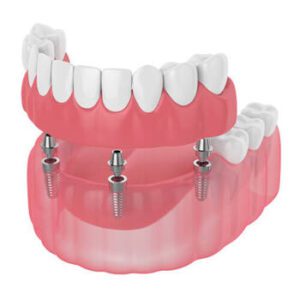In today’s age of dental advancements, searching for a permanent solution to tooth loss often leads many patients to the Full Arch Solution or All-On-4 dental implants. This transformative dental implant treatment offers those with missing teeth a second chance at regaining their confident smile, improving oral health, and enhancing their quality of life. Unlike traditional dentures or tooth bridges that might seem less stable or natural-looking, All-On-4 implants anchor a full set of replacement teeth onto just four implants. But how does this Full Arch Solution procedure differ from other dental implant options?
First, let’s delve into the costs involved. The All-On-4 dental implant cost can be a significant initial investment, though many find it a worthy trade-off for long-term benefits. Factors such as the materials used, the surgical procedure, and any additional procedures like bone grafting can influence the final cost in Australia. However, the treatment plan is comprehensive, often incorporating tooth extractions, implant placement, and follow-up appointments in the overall dental implant cost.
Notably, this revolutionary Full Arch Solution dental procedure is about new teeth and restoring the natural appearance and function that many crave after tooth loss. Unlike traditional implants requiring more extensive dental work or a tooth bridge that relies on surrounding teeth, the Full Arch Solution ensures a sturdy foundation in the jaw with just four implants, rendering a lasting and authentic look and feel.
The Basics of Dental Implants
Dental implants have risen to the forefront of modern dentistry when it comes to enhancing oral health and achieving a vibrant smile. They are hailed as the go-to solution for replacing missing teeth, bringing aesthetic appeal and improved functionality. The Full Arch Solution, or the four dental implant treatments, is at the heart of these advancements.

Cost, understandably, is a pressing concern for many patients. The Full Arch Solution cost can be influenced by several factors, including the materials used, the intricacies of the dental surgery, and even where one resides—with cost in Australia potentially differing from other regions. An initial consultation with a dentist will give a clearer picture of the potential dental implant cost tailored to individual needs.
However, one must focus on more than just the upfront investment. Traditional dentures and tooth bridges may seem less expensive initially, but dental implants offer long-term benefits, enhancing overall oral health and potentially reducing future dental work. With advancements like the All-On-4 treatment, individuals can now look forward to a permanent solution for tooth loss, blending seamlessly with their existing teeth and promising a natural appearance.
Why Choose All-On-4 Implants?
In the vast realm of dental solutions, one question often arises among patients: Why opt for All-On-4 dental implants? The short answer is its myriad benefits, especially compared to other dental implant options. Let’s delve deeper into what makes this Full Arch Solution treatment stand out.
Dental implants have emerged as a beacon of hope for those grappling with the challenge of missing teeth. They not only replace lost teeth but also protect oral health by preventing bone loss. However, the All-On-4 implant procedure takes it a notch higher. Instead of relying on an implant for each missing tooth, this treatment plan utilises four implants to support an entire set of replacement teeth. Such efficiency is beneficial in reducing dental surgery and recovery time and holds promise for a more stable and long-lasting solution.
Cost considerations naturally come into play when exploring dental solutions. The Full Arch Solution cost might be a significant initial investment. However, it offers value for money when evaluated against the long-term benefits and potential savings from avoiding future dental work or replacements. Moreover, factors such as the dental implant procedure’s complexity, materials used, and geographical factors (like the cost in Australia) can influence the overall implant cost.
But beyond the financials, the real worth of the All-On-4 treatment lies in its ability to restore a natural appearance, improve one’s quality of life, and offer a permanent solution to tooth loss. Unlike traditional dentures that may lead to gum disease or tooth bridges that might wear down remaining teeth, All-On-4 ensures a stable, durable, and virtually indistinguishable replacement for natural teeth.
The All-on-Four Implant Procedure
The Full Arch Solution, commonly known as All-On-4, has rapidly emerged as a game-changer in dental implant treatments. Designed for those with significant tooth loss, this procedure provides a comprehensive yet efficient approach to restoring a full mouth of teeth.
To understand the Full Arch procedure, one must first grasp the essence of dental implants. Traditional implants involve the placement of an implant for each missing tooth. In contrast, the All-On-4 treatment requires only four implants to support an entire arch of prosthetic teeth. These four implants are strategically placed in jaw areas with the highest bone density, ensuring optimal stability.
Cost often stands as a pivotal factor for many patients. The All-On-4 dental implant cost can be a significant initial investment. Yet, evaluating the longevity, aesthetics, and functionality offered often overshadows the recurrent costs and hassles of solutions like removable dentures or tooth bridges. Furthermore, the exact dental implant cost can vary based on several factors, such as the surgical procedure’s intricacy, materials used, and region-specific nuances like the cost in Australia.
The Full Arch treatment begins with an initial consultation where the dentist evaluates the patient’s oral health, facial structure, and bone density. This is followed by the dental implant surgery, where the four implants are placed. Post-implant placement, temporary teeth may be provided until the final teeth are ready for attachment.
This procedure’s true value lies in its ability to provide a permanent solution, enhancing the natural appearance and overall oral health. Patients can bid goodbye to issues associated with removable dentures or the risk of gum disease with tooth bridges. Instead, they gain a sturdy, natural-looking set of teeth, promising a rejuvenated quality of life.
Ideal Candidates for All-On-4 Dental Implants
The Full Arch Solution, also recognised as All-On-4, is an innovative dental implant procedure that has transformed the lives of countless individuals. However, like all dental treatments, it’s essential to ascertain if one is an ideal candidate for this procedure. Let’s explore who benefits the most from the Full Arch Solution.

Another factor to consider is bone density. The all 4 dental implant procedure places four implants in strategic positions in the jaw bone, eliminating the need for a bone graft in many cases. Those with a compromised jawbone, possibly from years of tooth loss, might find this solution particularly appealing.
Additionally, the cost plays an undeniable role in one’s decision. While the Full Arch Solution dental implant cost might seem like a significant investment upfront, the long-term benefits often balance it. This dental implant treatment eradicates many recurring expenses associated with traditional dentures or other dental implant options. For those concerned about the All four dental implants cost in Australia, many dental clinics offer financing options to make the procedure more accessible.
Ultimately, an initial consultation with a dental professional is crucial. They will assess overall oral health, the condition of any remaining teeth, facial structure, and other factors to determine if Full Arch Solution is the right choice. For many, this treatment plan not only restores their smile but significantly improves their quality of life, making it a worthwhile investment in their oral future.
Cost and Financing Options
The associated cost is one of the foremost concerns for many patients considering the Full Arch Solution dental implants. Undeniably, the Full Arch Solution cost might be a bigger investment upfront than some traditional dental treatments. The intricacy of the dental implant procedure, materials used, and regional factors, such as the cost in Australia, all play a role in determining the overall expense.
However, viewing this cost in light of the long-term benefits is essential. With All-On-4 dental implants, you’re investing in a permanent solution to tooth loss, potentially reducing future dental work and improving quality of life. Moreover, many dental clinics recognise the financial commitment and offer various financing options to ease the initial burden.
During an initial consultation, discussing the All-On-4 dental implant cost, understanding the treatment plan, and exploring available financing options are advisable. This ensures a well-informed decision, allowing many patients to achieve natural-looking results without being overly burdened by the expense.
Comparing Full Arch Solution Other Dental Solutions
The Full Arch Solution, or All-On-4, stands out as a revolutionary dental implant treatment, particularly when juxtaposed against other dental solutions. A primary advantage is its efficiency: where traditional implants may require an implant for each missing tooth, Full Arch Solution uses just four implants to anchor a full set of prosthetic teeth. This simplifies the dental implant procedure and potentially reduces the overall implant cost.
When considering the All-On-4 dental implants cost relative to other solutions, it’s essential to consider the long-term benefits. Unlike removable dentures or tooth bridges, which may need regular adjustments or replacements, All-On-4 offers a more permanent solution. The result? A natural appearance, improved oral health, and an enhanced quality of life.
While cheaper initially, traditional dentures can impact bone density in the jaw over time and may not provide the natural look and feel many patients desire. Tooth bridges, on the other hand, tooth bridges require the alteration of adjacent natural teeth, which could be better for oral health.
While the initial investment for Full Arch Solution might be higher, its longevity, combined with financing options offered by many clinics, makes it a worthy consideration for those prioritising long-term oral health benefits.
Common Misconceptions and Myths of Full Arch Solution
As with many dental treatments, the All-On-4 implants are familiar with misconceptions and myths. One common belief is that the All-On-4 dental implant cost is prohibitively expensive. While there’s no denying that there’s a bigger investment upfront, the long-term benefits and durability of this treatment often make it more cost-effective than other options.
Another misconception is that this treatment is just for older people or those with significant tooth loss. In reality, many patients of varying ages and needs opt for this solution, especially when replacing missing teeth with a more permanent solution.
Some people also believe the All-On-4 procedure is more painful than traditional implants or other dental surgeries. However, advancements in dental implant procedures and materials often mean less discomfort and a quicker recovery.
Lastly, there’s a myth that these implants won’t look like natural teeth. With modern prosthetic teeth and customisation options, many patients find that their new teeth offer a stunningly natural appearance, boosting confidence and improving quality of life.
Understanding the facts can help dispel these myths, allowing patients to make informed decisions about their oral health.
Potential Risks and Complications of Full Arch Solution
Like any dental procedure, the Full Arch Solution has potential risks and complications. While the allure of replacing missing teeth and achieving natural-looking results is significant, it’s essential to be informed. The dental implant procedure, though commonly successful, can sometimes lead to complications.
One potential risk is implant failure, possibly due to poor oral health or gum disease. Proper dental work before the procedure can minimise this. Another concern is the potential for infection post-dental implant surgery. Regular follow-up appointments are crucial to monitor and ensure no signs of infection develop.
Some patients may require bone grafting, introducing additional procedures and potential complications. The quality of the jaw bone also determines the success of the Full Arch Solution. Those with low bone density might face challenges.
Post-Surgical Maintenance for All-On-4 Dental Implants
The Immediate Healing Phase: Following the dental implant procedure, the initial healing phase is pivotal for ensuring the long-term success of the Full Arch Solution. Immediate aftercare dictates the quality of life one can expect after choosing this permanent solution for replacing missing teeth.
Rest and Routine: It’s paramount to allow your oral health the time it needs to recover. Many patients, understanding the significant initial investment of All-On-4 implants, are keen on maximising their returns by adhering strictly to postoperative routines.
Nutritional Recommendations:
- Shift to Milder Foods: Following dental implant surgery, your set of teeth—particularly the new teeth—will be sensitive. Opting for softer foods minimises the strain on the implant area, ensuring better healing.
- Ensure Adequate Fluid Intake: Hydration aids in recovery. Drinking plenty of water while avoiding overly hot or cold beverages is recommended.
- Foods to Avoid: Spicy foods, hard foods, and extreme temperatures should be sidestepped initially to avoid complications.
Oral Health Practices:
Mindful Tooth Cleaning: While maintaining oral hygiene is crucial, aggressive brushing can harm the dental implant area. Soft-bristled brushes and gentle motions are advised.
- Regular Mouth Rinsing: Using prescribed saline or antiseptic solutions can prevent gum disease and other infections post-surgical procedures.
- Alternative Flossing Methods: Traditional flossing might not be suitable initially. Speak with your dentist about alternatives to ensure optimum oral health without causing harm.
Routine Dental Check-ins:
- Early Dental Reviews: Early follow-up appointments after the procedure can help identify and rectify any issues before they escalate.
- Continual Dental Monitoring: Long-term success requires constant dialogue with your dentist, with regular check-ins to monitor the health of your implants and surrounding natural teeth.
In conclusion, understanding post-operative care is essential in maximising the benefits of the All-On-4 treatment.
Conclusion
In dental innovations, the Full Arch Solution dental implants have emerged as a game-changer for many patients. If you’ve faced tooth loss or been grappling with the nuances of missing teeth, this comprehensive treatment can restore your smile, overall oral health, and quality of life. While the initial All-On-4 dental implant cost might seem like a significant investment, the long-term benefits, from a natural appearance to functional prosthetic teeth, make it worth every penny.
Considering the cost in Australia, Dental 266 offers not just competitive pricing for full-mouth dental implants but a plethora of dental implant options tailored to individual needs. While cost-effective, traditional dentures often don’t provide the permanent solution that All-On-4 treatment promises. And remember, this is not just about replacing missing teeth but ensuring that you achieve natural-looking results that last long term.
Are you considering a dental implant procedure? Are factors like the dental implant cost or the specifics of the dental implant surgery causing hesitation? At Dental 266, our team guides you through every step, from initial consultation to follow-up appointments.
Take the first step towards a brighter smile and improved oral health. Visit Dental 266 and explore the world of possibilities with All-On-4 dental implants and other dental treatments. Call Dental 266 on (02) 9051 0600.
Note: Any surgical or invasive procedure carries risks. Before proceeding, you should seek a second opinion from an appropriately qualified health practitioner.
References:
https://pubmed.ncbi.nlm.nih.gov/8699485/
https://www.dentalhealth.org/Blog/dental-implants-and-how-crucial-replacing-teeth-really-is
https://www.researchgate.net/publication/305508522_All-on-4R_Implant_Treatment_Common_Pitfalls_and_Methods_to_Overcome_Them
https://www.webmd.com/oral-health/dental-implants
www.verywellhealth.com/what-to-expect-during-a-dental-implant-procedure-1059372


 Mindful Tooth Cleaning: While maintaining oral hygiene is crucial, aggressive brushing can harm the dental implant area. Soft-bristled brushes and gentle motions are advised.
Mindful Tooth Cleaning: While maintaining oral hygiene is crucial, aggressive brushing can harm the dental implant area. Soft-bristled brushes and gentle motions are advised.



